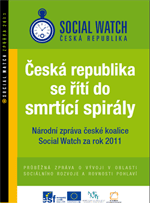Czech Republic
| Source: . Published on Wed, 2013-08-14 00:00 |
| Source: . Published on Wed, 2013-08-07 00:00 |
| Source: . Published on Tue, 2013-08-06 00:00 |
Published on Fri, 2012-11-23 14:22
Achieving food security as a common responsibility of the South and North, promoting decent work and providing electrification for all by 2030 at the national level: those are the focuses of attention of a broad non-governmental alliance created in the Czech Republic against poverty. To achieve them, the Czech Social Watch coalition thinks it necessary to rebuild the financial architecture at the global level. |
|
Unemployment at ten percent, government reforms undermining the economy, antisocial and anti-family policies, corruption among politicians and capital flight from the economy into tax havens, destruction of the instruments of environmental protection, inability of the media to aptly inform on domestic and foreign affairs, low level of cooperation to address the crisis among civic activities – this is last year in the Czech Republic.
|
Published on Thu, 2012-08-23 08:48
Conditions of life in the Czech Republic worsened last year, but the Government is persisting with policies like those that led Greece into its current crisis. This bleak analysis comes from the fifth annual report by the country’s Social Watch coalition, which also questions the budget cuts that have been made and highlights their negative impact on families and on the national economy. Other critical points it examines are political corruption, tax evasion, gender inequity and serious deficiencies in environmental protection. |
|
Published on Mon, 2012-03-19 08:48
In terms of gender equity the Czech Republic places itself at the European average, but below some of its neighbours. |
|
The country is more and more dependent on exports to neighbouring countries while its current account deficit does not seem to be curtailed. The Government is sticking to the implementation of a neo-liberal nonsustainable model, which undermines social well-being, and is refusing to consider policy on a long-term basis.
Currently, the country faces threats such as the impoverishment of middle-class and low-income groups, increasing unemployment and rampant gender inequality. Loss of biodiversity and radioactive pollution are among the environmental challenges that need to be assessed immediately. Increasing involvement in these issues by civic society gives some hope that the demand for change will be heeded.
|
| Source: . Published on Thu, 2011-07-21 08:43 |
SUSCRIBE TO OUR NEWSLETTER









